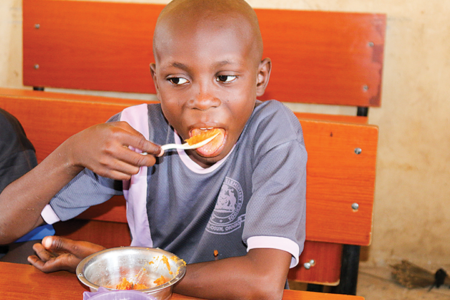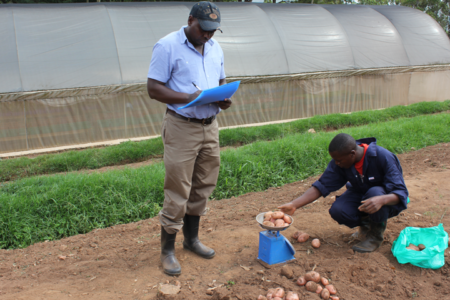
Delivering more vitamin-A through consumer-demanded products.
Recently the International Potato Center (CIP) and its partners in Africa have been exploring ways to increase OFSP consumption through processed products, such as baked goods.
Background
Orange-fleshed sweet potato (OFSP) is a highly nutritious biofortified root crop that is conventionally bred to contain high levels of beta-carotene. Beta-carotene gives OFSP its orange colour and when consumed, the body converts it to vitamin A (retinol) which promotes good eyesight and maintains a healthy reproductive and immune system. Vitamin A is also essential for healthy development in young children under five, preventing childhood stunting and early blindness. In addition, OFSP is also a good source of potassium, fibre, and vitamins C and B6. Thus, nutritional interventions such as the introduction of biofortified OFSP make a significant contribution towards the fight against malnutrition, particularly vitamin A deficiency in Africa.
Animal-based products such as dairy products, meats, poultry, and fish are also good sources of vitamin A, but they are expensive and beyond the reach of many poor and vulnerable populations. This shortcoming makes OFSP a cost-effective and sustainable alternative for meeting vitamin A nutritional requirements, especially in subSaharan Africa (SSA), which has some of the highest rates of vitamin A deficiency in the world. In SSA, sweetpotato is typically consumed boiled, steamed or fried. Growing consumer demand for sweetpotato has seen an increase in production and opened additional avenues for incorporating sweetpotato as an ingredient in other dishes. For example, in urban markets, OFSP serves as a functional ingredient in processed foods and nutraceuticals. The roots can be steamed and processed into a puree that can be used in various products such as baby food, casseroles, and puddings, helping to boost nutritional content at the expense of less nutritious sugars and flours.
The International Potato Center (CIP) and its partners have been exploring ways to increase OFSP consumption through processed products, such as baked goods. Studies conducted by CIP demonstrate that 125g of fresh OFSP roots is enough to meet the recommended daily allowance for vitamin A for children. Lab analysis has found that OFSP purée bread is a good source of vitamin A for growing children who need 400 Retinol Activity Equivalents (RAE) daily. One 30-gram slice of this bread provides 50 RAE. Thus, just two sandwiches a day can provide more than 25% of a child’s daily vitamin A requirement.
In bakery products, OFSP puree can replace the use of wheat flour by up to 60%, which also presents economic advantages. Given that wheat flour is often imported, using OFSP puree would allow many East African countries to save much-needed foreign currency and reduce dependence on wheat imports whose prices are highly volatile.
Objectives
Overall, this project seeks to increase OFSP consumption in target communities through demand creation efforts for OFSP-based products while empowering women and youth with income-generating opportunities.
To fulfill this goal, we will be guided by two objectives:
- To promote the commercialization of OFSP puree through demand creation, value addition, and processing of bakery products; and
- To improve the incomes of small-holder farmers and nutrition status of consumers in Ethiopia, Kenya, Rwanda, Tanzania and Uganda through a profitable and vibrant OFSP-based food value chain.
Approach and method
In this project, the International Potato Center (CIP) worked in partnership with Euro-Ingredients Limited (EIL) in Kenya, Makerere University in Uganda, Hawassa University in Ethiopia, A Women’s Bakery in Rwanda and Afco Investments in Tanzania. EIL is based in Nairobi and has many years’ experience supporting bakery operations throughout East Africa with food science, baking technologies, and OFSP puree processing equipment. CIP provided technical support to EIL and served as the link between smallholder sweetpotato farmers and OFSP puree processing ventures. Each of our partners received a complete set of OFSP puree processing equipment, consisting of high fibre puree machines, root washing units, steaming vats and vacuum sealers. CIP and its partners hosted a series of technology demonstrations with formal and informal sectors in the implementing countries. Participants were trained on OFSP puree utilization, OFSP baked products development, and food safety and hygiene practices. Samples of the OFSP products developed were collected and analyzed by CIP’s Food and Nutritional Evaluation Laboratory for composition of Vitamin A and C, moisture content, crude fat/oils content, ash content, crude fibre, protein content,
and minerals.
In collaboration with a leading media company, Mediae, market demand was cultivated through an OFSP puree awareness creation campaign. Mediae was tasked with producing and airing ten episodes on accessing highquality OFSP vines, planting management, harvest and market access, and value addition to OFSP. These episodes were broadcasted on Kenya’s most-watched television channel with a target viewership of six million weekly viewers. The CGIAR Research Program on Roots, Tubers and Bananas provided support to these efforts through its Scaling Fund project.
Customised business development services were offered to SMEs involved in the OFSP value chain to equip them with the right skill set needed to thrive and grow their businesses while promoting better livelihoods, nutrition, and food security. The SMEs were encouraged to identify specific opportunities and threats at each node of the OFSP value chain and implement strategies to maximize the opportunities and mitigate threats.
Evaluation
We evaluated the following aspects of the work to chart our progress:
- Number of private sector partners successfully recruited for OFSP puree processing led by women and employing mainly women;
- Number of financing and equipment buy-out agreements signed;
- Procurement of equipment for OFSP puree processing for private companies;
- Consumer acceptance and willingness to pay studies reports for OFSP puree products;
- Markets assessment for baked and fried wheat products;
- Demand creation and messaging for OFSP and farmer mobilization;
- Capacity building and OFSP puree product market penetration strategy development; and
- Food production and food safety training
The project was successful in meeting the following objectives:
- Selected bakeries and street vendors in Kenya, Ethiopia, Rwanda, Uganda and Tanzania were trained on using OFSP puree as a key ingredient in baked and fried products;
- Increased employment and income generating activities are available to women and youth in Kenya, Ethiopia, Rwanda, Uganda, and Tanzania due to OFSP puree processing work;
- Companies realized a reduced cost of production for baked and fried products, hence, increased savings for bakeries in both the formal and informal sector; and
- Increased awareness of OFSP puree-based products and their nutritional benefits amongst low-income consumers.

Contact
Mukani Moyo
CIP, Kenya
mukani.moyo@cgiar.org
Thanks to our donors



